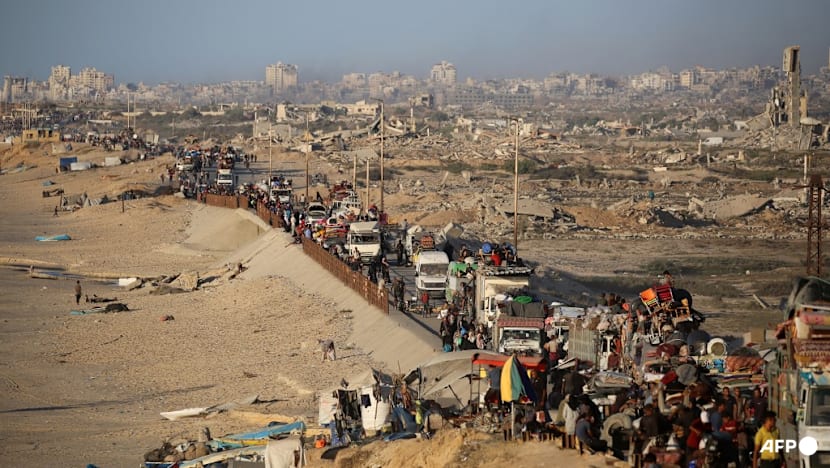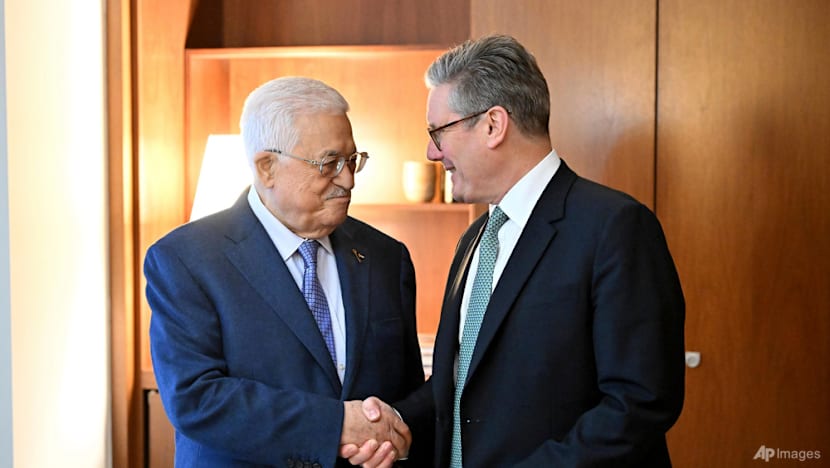CNA Explains: What does it mean to recognise a Palestinian state?
Britain, Canada, Australia and Portugal on Sunday (Sep 21) recognised a Palestinian state, with other countries expected to do the same at the annual UN General Assembly.

Displaced Palestinians move with their belongings southwards on a road in the Nuseirat refugee camp area in the central Gaza Strip on Sep 20, 2025, as Israel presses its ground offensive to capture Gaza City. (Photo: AFP/Eyad BABA)

This audio is generated by an AI tool.
SINGAPORE: Britain, Canada, Australia and Portugal on Sunday (Sep 21) recognised a Palestinian state, a historic shift in decades of Western foreign policy.
It marks a fresh push into the quest for a two-state solution to the Israeli-Palestinian conflict, amid an increasingly desperate humanitarian situation in Gaza.
Other countries, including France, are also expected to recognise a Palestinian state during key talks at the annual UN General Assembly that opens on Monday.
But the road to statehood faces major obstacles, including vehement objections by the United States – a staunch Israeli ally.
What are the prospects of creating a Palestinian state, and will it change anything?
What does it mean to recognise a Palestinian state?
Four criteria for statehood are listed in the Montevideo Convention - a permanent population, a defined territory, a government and the capacity to enter into relations with other states.
Having a defined territory may be the most problematic factor for the Palestinians, as there is no agreement on boundaries.
Israel restricts access to goods. There are no Palestinian airports. The landlocked West Bank can be reached only through Israel or through the Israeli-controlled border with Jordan, and Israel controls all access to the Gaza Strip.
In terms of governance, the Palestinian Authority has only ever governed parts of the West Bank, with other areas under Israeli control. It lost its hold on the Gaza Strip to the militant group Hamas in 2007, effectively creating two separate Palestinian governing entities.
Romain Le Boeuf, a professor in international law at the University of Aix-Marseille in southern France, described recognition of Palestinian statehood as "one of the most complicated questions" in international law, "a little like a halfway point between the political and juridical".
However, there is one point on which international law is quite clear: "Recognition does not mean that a state has been created, no more than the lack of recognition prevents the state from existing."
How long has Palestine been fighting for recognition?
In 1947, the UN voted to partition Palestine – then under British administration – into Jewish and Arab states, with the city of Jerusalem as a separate international entity.
The next year, Israel declared independence on May 14. The First Arab-Israeli War immediately broke out, when its Arab neighbours invaded. Israel fought back and increased the land under its control, capturing West Jerusalem and some areas initially designated for a future Palestinian state.
Years of skirmishes then led to the 1967 Six-Day War, where Israel took control of the Gaza Strip and West Bank territories, along with East Jerusalem.
Tensions never abated and in November 1988, the Palestine Liberation Organization (PLO) – a coalition of factions in the Palestinian national movement – proclaimed the state of Palestine with a capital in Jerusalem.
In the ensuing months, many countries recognised Palestine’s independence. To gain more support, the PLO renounced terrorism and recognised Israel’s right to exist.
In the 1990s, diplomatic efforts led to the Oslo Accords where Israel and the PLO mutually recognised each other. This was supposed to bring lasting peace.
The Oslo Accords also established the Palestinian Authority, an interim administration in Gaza and the West Bank. It was supposed to govern for five years, while talks on a permanent two-state solution continued. This imagines Israel and Palestine living peacefully side-by-side, as the outcome of an agreement negotiated by both governments.
But this did not happen. Today, the Palestinian Authority – controlled by the Fatah party that dominates the PLO – still partially rules the Israeli-occupied West Bank.
In 2007, Hamas seized control of Gaza. The militant group led an attack on Israel on Oct 7, 2023, triggering the ongoing conflict that has killed thousands.

How about recognition through the United Nations?
Palestine has twice applied unsuccessfully to be a UN member state. Membership requires a decision of the UN’s policymaking General Assembly upon the recommendation of the Security Council.
Both times, Palestine’s bids failed at the Security Council, which is dominated by a few powers, and made some progress in the General Assembly, where each member has one vote.
A Security Council resolution needs at least nine votes in favour and no vetoes from its five permanent members – China, France, Russia, the United Kingdom and the United States.
Palestine’s first attempt in 2011 failed as the Security Council did not make a unanimous recommendation. But the General Assembly voted to grant Palestine non-member observer status, which it has held since 2012.
In 2024, Palestine tried again and was blocked by a US veto in the Security Council. In a later General Assembly resolution, most UN member states, including Singapore, voted in support of Palestine’s full membership.
Will recognising a Palestinian state change anything?
Three-quarters of UN members now recognise the State of Palestine.
Britain's decision was particularly significant given its major role in Israel's creation as a modern nation in the aftermath of World War II.
Although some observers see recognition as mere symbolism, it carries hope and possibilities for Palestinians.
Dr Burcu Ozcelik, Senior Research Fellow for Middle East Security within the International Security Department at Royal United Services Institute, said the recognition of a Palestinian state has “great significance”.
“This declaration of recognition of Palestinian statehood is meant to deter the possibility that Palestinians can be forcefully moved. And that is a win in defence of Palestinian statehood in and of itself, and that matters because that is now a firm commitment by the United Kingdom that they will not allow that to happen,” Dr Ozcelik said.
Husam Zomlot, head of the Palestinian mission to the UK, said it could lead to partnerships between entities on an equal footing.
It might also force countries to review aspects of their relationships with Israel, said Vincent Fean, a former British diplomat in Jerusalem.
In Britain's case, this might result in banning products that come from Israeli settlements in occupied Palestinian territories, he said, even though the practical impact on the Israeli economy would be minimal.
Charles Kupchan, senior fellow at the Council on Foreign Relations, told CNA that the recognition of a Palestinian state would mean a new level of diplomatic isolation of Israel.
“It doesn't really change anything on the ground, because Israel seems determined to keep pushing to destroy Hamas. But isolation, I think, is the keyword here, looking forward and when it comes to Israel,” he added.
In the short-term, it will deepen the resolve of Israeli Prime Minister Benjamin Netanyahu to double down on his attempts to eliminate Hamas, Kupchan said.
But in the longer term, a new centre may emerge within Israeli politics that may be more ready to move on to the question of self-determination for Palestinians, he noted.
“If you have a leader ready to do that, then pointing out that Israel is isolated, that some of its key allies in the world have recognised Palestinian statehood in the long run, that may affect the outcome of this debate - but not now.”
What's next?
Dr Ozcelik noted that although recognising a Palestinian statehood will not change much on the ground in Gaza, the “glimmer of hope” is still important.
“That will matter for those on the ground, but there will be questions - if this act of declaration of recognition is being supported now by the UK, by France, what next? How will our circumstances improve? And I don't think that there is an answer to that,” he said.
“The only answer will come with meaningful progress on the wider context of a two-state solution."
Without the US coming on board with the idea of a Palestinian state, “very little” will change on the ground, Dr Ozcelik added.
Kupchan similarly noted the need for a two-state solution for the conflict to come to an end.
“There is no alternative to a two-state solution, because there is no one state solution … a Jewish state is not willingly going to hand over power to those that they see as an enemy, at least for now,” he explained.
“If this conflict is going to end, ultimately, there needs to be Palestinian self-determination, whether this is a full-on state - as we think about most states - or a state that has limited powers, because Israel retains a certain measure of control over security, over borders, so that remains to be seen,” he said.
“But I do think in the end of the day, in part, for Israel's survival as a secure democracy, in the end, there has to be a state for the Palestinians that live there.”
How have the US and Israel reacted?
The United States, a staunch ally of Israel, criticised the moves as "performative” and said it was focused on finding a diplomatic solution to the Israel-Hamas conflict.
"Our priorities are clear: the release of the hostages, the security of Israel, and peace and prosperity for the entire region that is only possible free from Hamas," a State Department spokesperson said on condition of anonymity.
Netanyahu also condemned the moves, vowing that a Palestinian state would not be established.
"I have a clear message to those leaders who recognise a Palestinian state after the horrific massacre of Oct 7: You are giving a huge reward to terrorism," he said, referring to Palestinian militant group Hamas' 2023 attack on Israel that triggered the nearly two-year war in Gaza.
"And I have another message for you: It will not happen. A Palestinian state will not be established west of the Jordan River."
Netanyahu also vowed to expand Jewish settlements in the West Bank, which Israel has controlled since 1967 in an occupation considered illegal under international law.




















